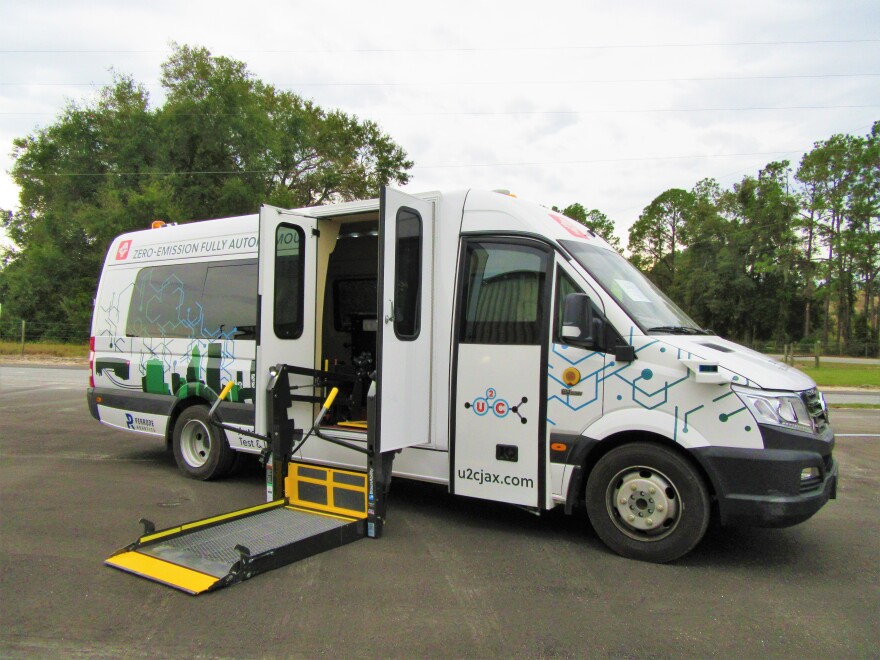The Jacksonville Transportation Authority (JTA) has purchased its first self-driving ADA-compliant zero-emission passenger van.
The electric-powered van, which is designed for more than a dozen passengers, is undergoing testing at JTA’s Armsdale Test & Learn facility, where JTA’a autonomy team is working on mapping for the vehicle.
Eventually, it will be able to navigate without any human interaction on predefined, geofenced routes.
Geofences are virtual perimeters for a geographic area.
The van will be able to communicate with the city’s infrastructure, knowing things like how long a light will remain green.
Although the van can go up to 150 miles on a charge without anyone behind the wheel, JTA will have a safety driver on board at all times in case anything goes wrong, such as a traffic signal going on the fritz.
“What happens is that if it comes to an intersection where it’s expecting a light and expected a signal, and it doesn't receive one, it comes up to where it would expect to stop at a stoplight. And it'll stop and have at that point, the safety driver will take over in manual and navigate safely through the intersection. And then we would reengage in autonomous mode,” said JTA Director of Automation & Quality Assurance Bill Frazier.

Called the EV Star, the passenger van was built by the GreenPower Motor Company, which is headquartered in Vancouver, Canada. It has a Perrone Robotics automation kit. Perrone Robotics has its test track and headquarters in Crozet, Virginia.
JTA is positioning itself to be a leader in autonomous transit. Right now JTA is soliciting bids from companies to fully implement its vision for autonomous transit. A contract is expected to issued to the winning applicant in July.
After that, JTA hopes to get a fleet of autonomous vehicles, including the EV Star, onto city streets within two years.
The overall autonomy program is known as the Ultimate Urban Circulator (U2C), which will eventually expand and replace the existing Skyway monorail system that runs through Downtown Jacksonville and the Southbank.
Unlike the Skyway, JTA’s upcoming fleet of electric self-driving people movers will be able to travel at street level, and on the elevated Skyway tracks, which will be modified over time to accommodate the new vehicles.
JTA has been testing autonomous vehicles from a range of vendors, including Navya and Local Motors. The money needed to launch the U2C program is fully funded at $44 million. In August, JTA took possession of the Olli 2.0, which is Local Motor’s first electric, 3D-printed autonomous shuttle to be built in the U.S. At the time, it was JTA’s sixth autonomous test vehicle for the U2C program.
The U2C is the centerpiece of a larger project known as the BayJax Innovation Corridor, which is bringing together a variety of agencies to turn Bay Street in Downtown Jacksonville into what’s known as a smart-corridor; where things like police cameras, autonomous transit vehicles, and perhaps even solar-powered sidewalks, all work in unison.
The EV Star isn’t the first autonomous paratransit vehicle JTA has looked at. In 2019, the agency tested an autonomous Navya electric test vehicle fitted for riders with special needs. At the time, it was billed as the first ADA accessible transit vehicle in the U.S.
After installing its autonomy kit in the EV Star for JTA, Perrone Robotics dubbed it, the AV Star, writing, “AV Star is the world's first fully autonomous, all electric, ADA compliant, FMVSS compliant, Altoona tested, with Buy American compliance on path transit van.”
FMVSS stands for the Federal Motor Vehicle Safety Standards.
Vehicles like the AV Star are running between about $400,000 and $600,000, Fraiser said, saying JTA's vehicle was paid for out of the transit agency's local operating dollars, as opposed to a grant.
Fraizer said the autonomous passenger van is powered by a 250 kilowatt battery pack that is recharged with a 110 kilowatt charger. It can be charged from about 20% to 100% in approximately 2.5 hours.
Bill Bortzfield can be reached at bbortzfield@wjct.org, 904-358-6349 or on Twitter at @BortzInJax.








